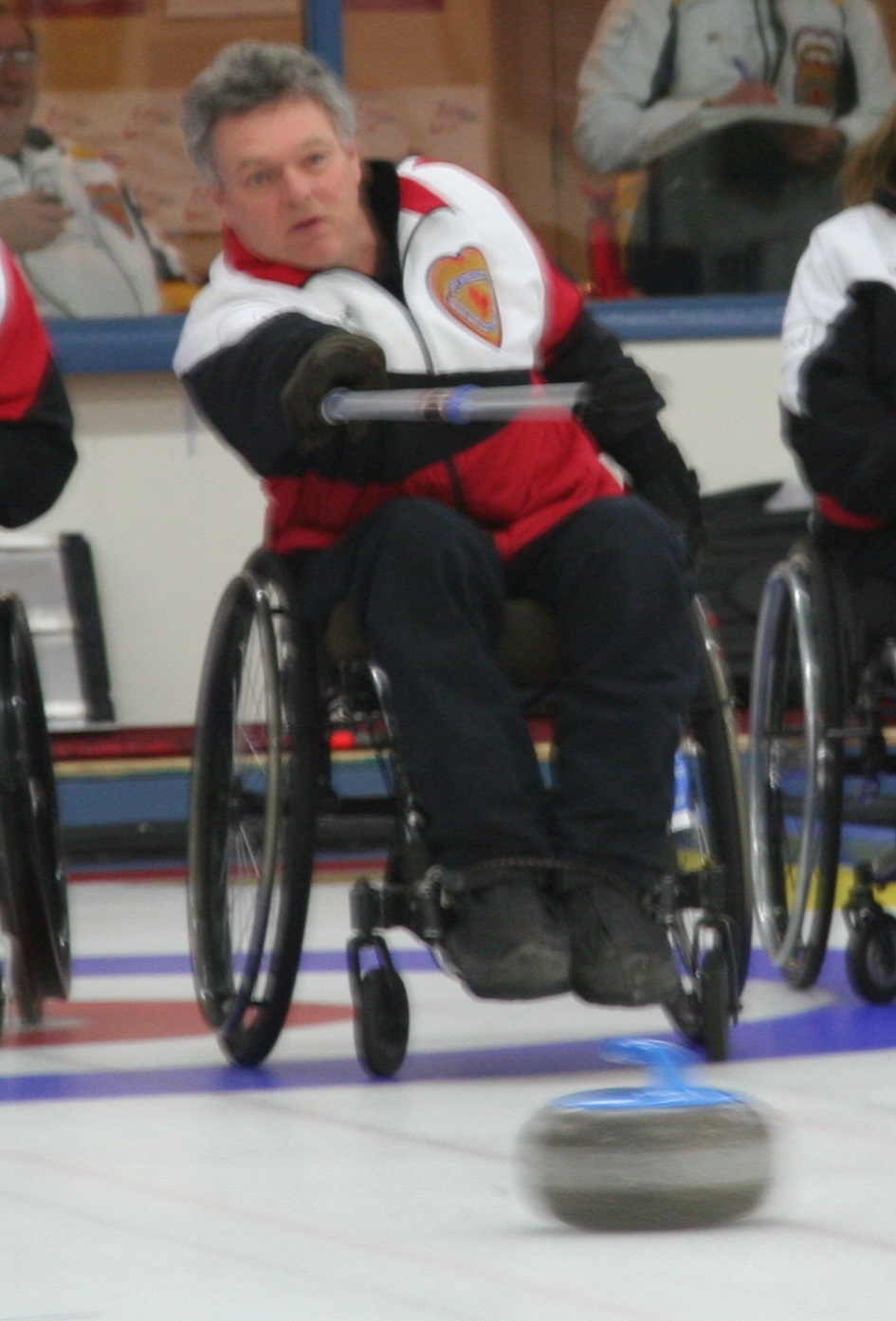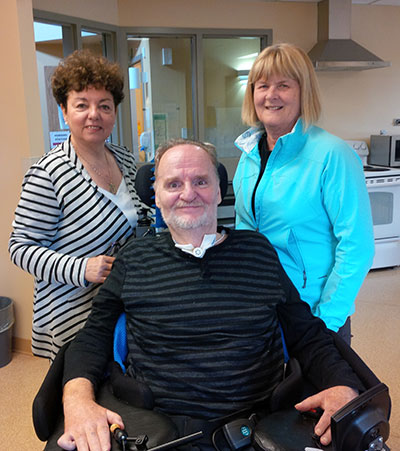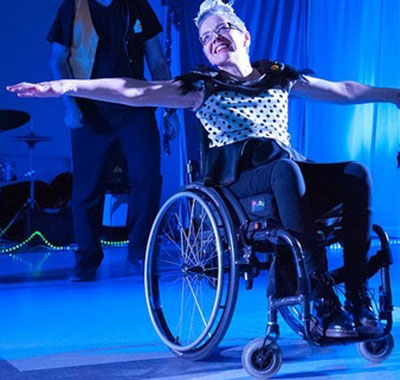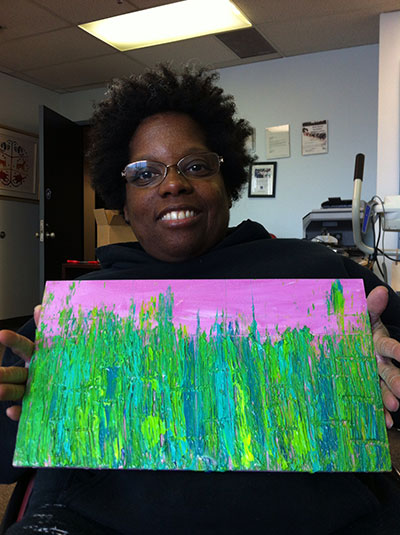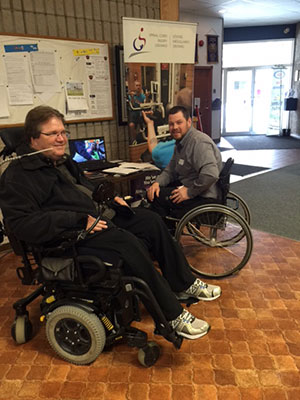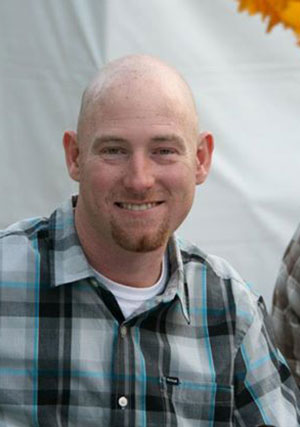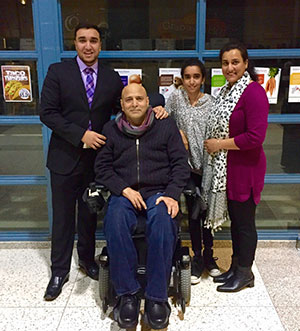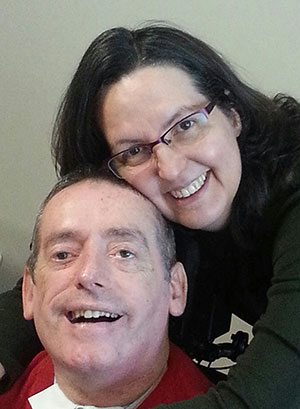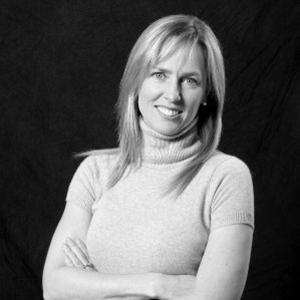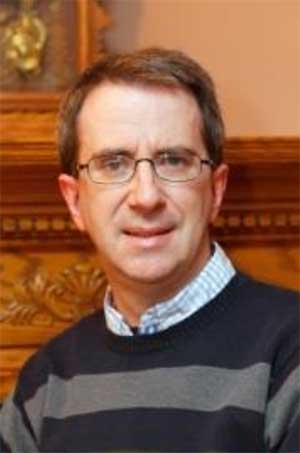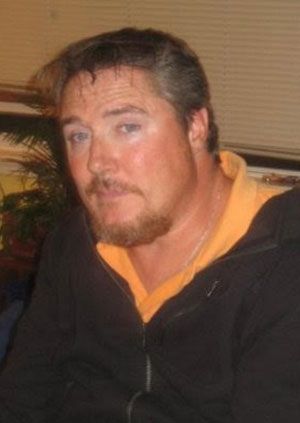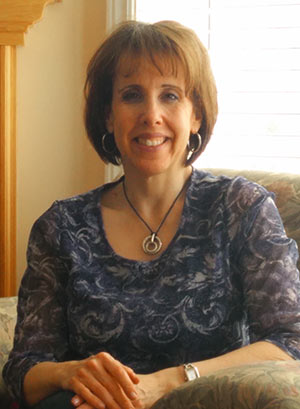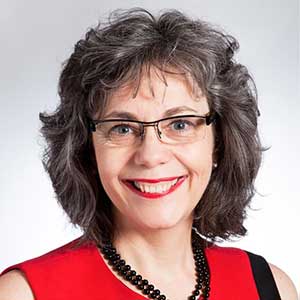Muniba honours Stephanie, her family and her husband
Watching Randy and Maura interact, it’s like something straight out of When Harry Met Sally. Remember those clips sprinkled throughout the movie? With the couples sitting on the couch together, finishing each other’s sentences? They showed us what true love looked like and couldn't help but make you smile.
That’s Randy and Maura.
Randy has quadriplegia and is blind. The cause of his illness is unknown; but it is a kind of neuro-muscular disorder which has yet to be diagnosed. The effect of the virus has progressed throughout his life and he now has limited movement of his head and uses a ventilator to breathe. He met Maura, a volunteer from Brazil, while he was living at a complex continuing care facility. Randy was helping her with her English while she volunteered at the hospital. They became friends and over time, fell in love. They have since married. Now, they are role models for many who wish to not only live, but thrive, in the community despite the systemic barriers that remain.
Randy is very clear about how he feels about Maura. “My love for Maura was unbelievable. I never loved anyone as much as her. When we were apart, all I did was think of her. She was my pride and joy, and I wanted to share every moment with her; but with me living inside an institution, it was just not possible,” he says. Their love for each other has helped them to overcome challenges throughout the years. The first one they faced was early on in their relationship: moving in together. As Randy mentions, it was difficult having a relationship while he was living in the continuing care facility. They were hoping to move in together outside of the hospital and in the community.
Randy had been on a waiting list for two years for accessible housing. When he finally got the call that an apartment had become available, they had two weeks to accept. It might seem like an easy decision, but staff would not allow Randy to leave the hospital unless he had the right equipment to live on his own. This included an environmental control machine costing thousands of dollars, which enables Randy to do things like answer the phone and open the door. Raising enough money would mean that Randy could live outside of the hospital. It would also mean that he and Maura could finally move in together. In the next two weeks, they reached out to their network, and did everything they could.
They were successful.
Randy and Maura raised $20,000 in just two weeks. It was possible with the support of the media and community organizations, including Spinal Cord Injury Ontario (SCI Ontario). Randy believes that they were able to raise the money because people could see how much he wanted to make it happen. It’s just one of a long list of examples that show Randy’s passion, drive and determination.
Although she felt overwhelmed at the time, Maura was happy to be moving in with the love of her life. Randy and Maura have since lived together for 16 years. A month after moving out of the hospital, the pair became Peer Support volunteers with SCI Ontario. Randy wanted to give back to a community organization that had helped him achieve his goal of living on his own. He also wanted to show others with disabilities that they could do whatever they set their minds to, believing that if he can do it, so can they.
One of the things Randy had set his mind to was writing a book about his life growing up with a disability and his experience living within an institution. The goal of the book was not to make a profit, but to inspire others and tell them not to quit. His personal mantra is “where there’s a will, there’s a way” and he always tries to find a way. Randy couldn’t type it with his hands and a regular keyboard, so he wrote by typing in Morse code. He used his cheek to tap on a metal tab, which was attached to his wheelchair and positioned beside his head. Each letter, each word was done in Morse code, all the while Randy adapted to the changes in his capabilities as life went on. Four years later his book, called Facing the Challenge, was complete. In it, Randy describes his experience living in an institution as he refers to it. He writes about the lack of privacy and independence he felt, as well as his activism while fighting for residents’ rights as President of the Resident’s Council.
When asked if it was Randy’s determination and fighting spirit that attracted him to her when they first met, Maura explains what set him apart. Randy loves life. Even though he can’t see, he can’t move, and he can’t control anything he does in a physical way; he has the capability to control his own life without limitation. She’s quick to add that his positive outlook on life is not something that comes easily to her, it takes effort and she feeds off Randy’s energy. What’s most attractive to her, she says, is that Randy has a vision of his own life in a completely different way than others do of him. It’s easy to see the love, affection and pride they have for one another. They have a casual banter, smiling often as they describe their life together.
Like any relationship, it’s not always this peachy. One of the most challenging things they face as a couple is keeping up with the physical progression of Randy’s condition. Not because it limits the things they can do together. It’s because it means figuring out new ways to do things. The creative process to find these solutions usually results in a lot of arguing between them as they go back and forth over the best approach. It’s just the way they brainstorm. Although they joke that, with getting older, they are going to need to find a new approach. Maura explains that she’s inquisitive and likes to find solutions, and Randy needs solutions, which is why they are a good match. Always thinking of others, Randy adds that once they have found a solution, they like to share it with others to help other people. He believes that his strength and purpose in life is to help others.
Randy and Maura have really enjoyed being part of the Peer Support Program and having the opportunity to share their experience and knowledge with others. Along the way, Randy has met many people, but there are two in particular that he would like to honour. The first person is Madelyn Scanlan. She was the Peer Support Coordinator with SCI Ontario at the time. Randy explains that Madelyn sets a very good example and has a way of making things look easier. Madelyn understands the challenges faced by those she helps and Randy admires that she never shies away from tough conversations or sharing her personal experience to help others feel more comfortable. The second person Randy honours is Luc Polnicky, a fellow Peer Support volunteer. He is a very good example of what can be achieved after sustaining a spinal cord injury and when you are motivated enough. He sustained an injury early in life and went on to become a social worker to help others. He’s also a fellow author, having written a book on his own experience with disability. It’s clear to see why he honours Madelyn and Luc; they have had a big impact on Randy.
As well as honouring others, Randy also honours himself. He does this because he is true to himself in spite of his physical circumstances and the fact that his capabilities are always changing. He says that he’s never given up and has always tried to do his best, like when, a few years ago, Randy had to get a tracheotomy and start using a ventilator to breathe. For a lot of people, they would see this as the end. For Randy, it was the beginning, giving him more energy, enough to finish his book and volunteer in the community.
Maura says that, in life, you have a choice to give up or keep going. Randy responds that he never gave himself that choice, it was always clear to him that he’d keep going. He’s motivated by helping others cope with their disabilities or problems, fiercely believing that you have to find the positive in everything. He says that he always tries to be an example for others.
And what an example he is.
Each of us has that same choice: to face the challenge or not. Perhaps we could follow Randy’s example and choose to face it with love.
To learn more about Randy and his book, visit:
https://www.facebook.com/FacingTheChallenge
